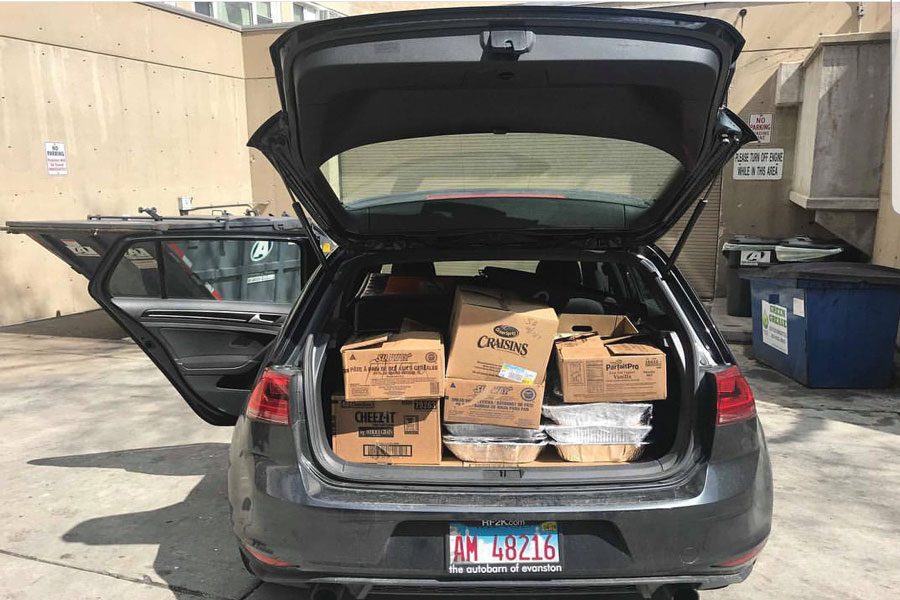After losing access to University vans, Campus Kitchens struggles with transportation costs
Boxes of food Campus Kitchens distributes to food-insecure Evanston residents. The organization can no longer use University vans, and now drives Zipcars or personal vehicles to transport the food around Evanston.
March 1, 2019
A single van is all Campus Kitchens would need to help feed the food-insecure people of Evanston. But since the beginning of the academic year, Campus Kitchens — alongside several other volunteer organizations — has not been allowed to drive the University vans they previously used.
On Sept. 17, University administrators sent an email to student-led volunteer organizations informing them that the vehicles they had used for free for many years would no longer be available.
For Campus Kitchens, a volunteer group that repackages leftover dining hall food to give to the Evanston community, losing access to University vans was difficult, said Campus Kitchens president Catherine May.
“It was a very official email like, ‘Dear community engagement student organizations, sorry the vans are dead,’” the McCormick junior said. “A lot of these groups didn’t see it coming at all. We kept going because we had to keep going. We can’t not deliver food to people who are hungry, but it was bad.”
Northwestern’s Campus Kitchens was one of the first branches established by the nationwide project and has used University vans to deliver food for over 15 years. Administrators suggested several alternatives to the free vans, including public transportation, ridesharing services, rental car services and bikes.
However, May said these options were “not very helpful.” Instead, Campus Kitchens opted to use the rental service Zipcar to deliver their food. Zipcars, though, are much smaller than University vans and can’t carry as much food. In addition, Zipcar charges per half hour spent driving, so renting a car out for an entire day would be unsustainable, May said.
Every month, Campus Kitchens delivers over 1,700 meals to about 800 clients in the Evanston community, including over 580 seniors and children. After hearing the news about the vans, Campus Kitchens was “blindsided” and canceled operations for a couple of weeks, said Weinberg senior Cate Ettinger, the organization’s vice president and treasurer.
“The fact that we had to cancel operations a bit because Northwestern cut our transportation … just shows that the administration is kind of blind to real service needs,” Ettinger said. “It’s not even that they thought that the vans were disposable, but they didn’t think about it at all. They just said, ‘We need to make budget cuts. Let’s cut these vans.’ And they didn’t think, ‘Who do those vans serve?’”
Campus Kitchens also had to make adjustments when Compass Group North America, the University’s food provider, took over from Sodexo for the 2018-2019 academic year. While the minor processes haven’t been altered too much, May said, problems arose with funding for the organization’s disposable products such as gloves, hairnets and food containers.
Prior to Compass’s takeover, a student-run group called Swipe Out Hunger would use donated dining dollars to fund Campus Kitchens. That leftover money was used to buy those disposable products, May said. However, May said, Swipe Out Hunger is no longer operating, leaving Campus Kitchens to pick up the cost.
Compass Group has attempted to alleviate some financial stress by donating a few thousand dollars to Campus Kitchens to “offset vehicle costs,” said Georgene Sardis, marketing director for Compass.
“I think it’s important to know that Compass Group wholeheartedly supports Campus Kitchens and when our locations have available product to donate, we do,” Sardis said.
Campus Kitchens received emergency funding from Associated Student Government in November, but the funding was provided on a cash card, May said. Zipcar can’t be paid for with a cash card — only debit or credit — so Campus Kitchens couldn’t use the money.
The organization is now waiting to see if their ASG B-Status funding application will be accepted so they can begin to receive more funds.
“We don’t have big donors, we don’t have a lot of members,” May said. “Everything we’re doing is volunteer work, and I don’t feel that budget cuts should slash one of the only resources we really need.”
Email: austinbenavides2022@u.northwestern.edu
Twitter: @awstinbenavides
Related Stories:
Almost a year later, a look back on how the budget deficit has impacted the University
ASG Senate approves $26,000 in emergency funding for student groups
Compass presents food service plan, dining hall renovations at ASG Senate


